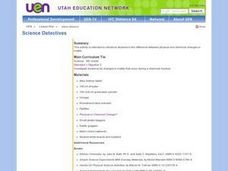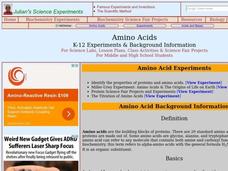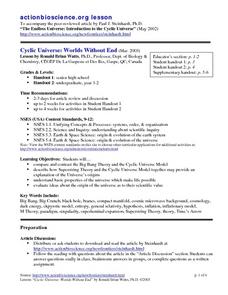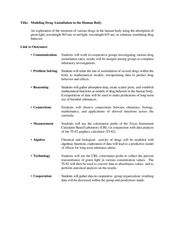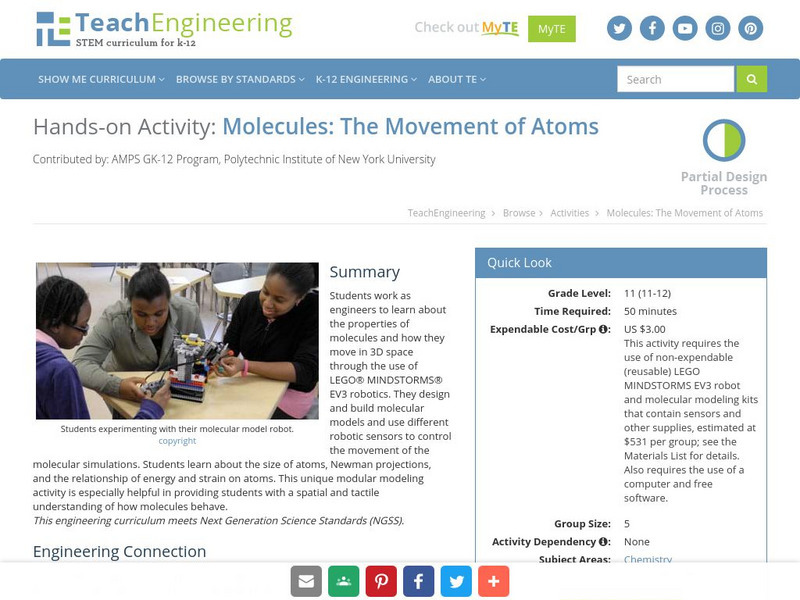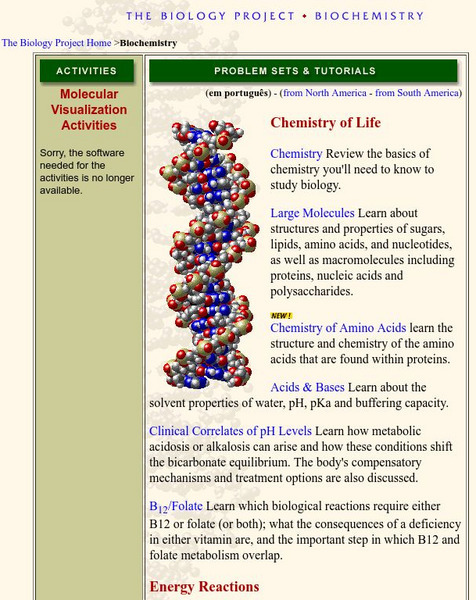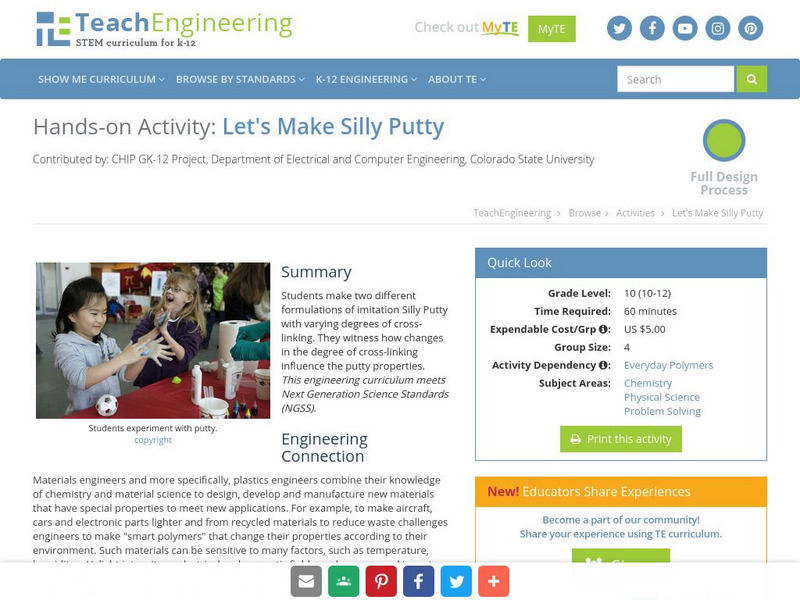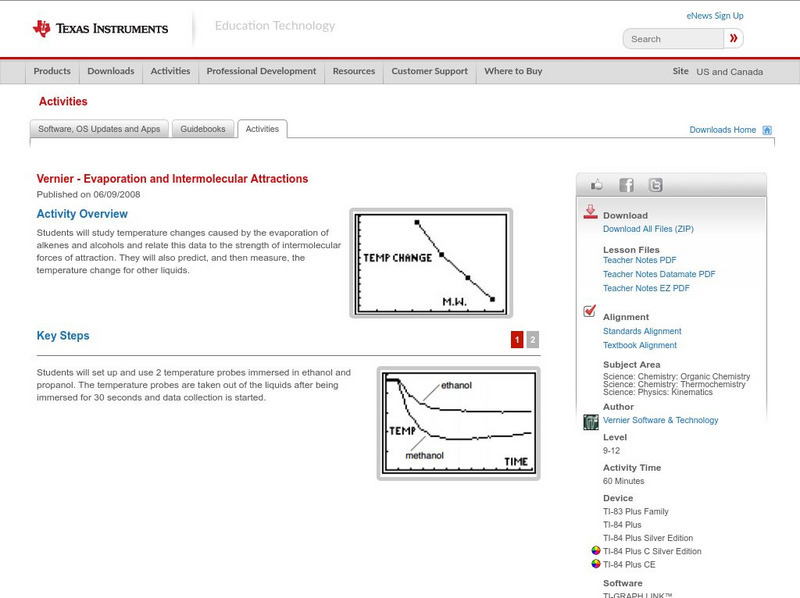Curated OER
??Discovering Patterns and Trends of the Periodic Table using PDAs??
For this lesson, 10th graders research the elements within a particular period of the periodic table of elements. Students gather data from PDA for each element and join other individuals to decpher the patterns in the peridoc table.
Curated OER
Science Detectives
Fifth graders examine the differences between chemical and physical changes. As a class, they are read a scenerio and determine whether it was deliberate act or not. In groups, they observe the changes of an alka-seltzer tablet and...
Curated OER
Building A Topographic Model
Students visualize, in three dimensions, features represented by contour lines on a topographic map. They see that the different elevations shown on a two dimensional topographic map can be used to build a 3-D model.
Curated OER
Phytoremediation
Students participate in a lab designed to facilitate the clean up and remove of substances ranging from heavy metals to dynamite. They focus on the remediation of copper. They discuss their results of this open ended inquiry experiment.
Curated OER
Amino Acids
Students explore what amino acids are, their history and how they are used in technology. In this protein lesson students identify the properties of proteins and amino acids.
Curated OER
Cyclic Universe: Worlds Without End
Students compare and contrast the Big Bang Theory and the Cyclic Universe Model. They explain basic properties of the univers which make life possible. They evaluate ideas about the origin of the universe as to their scientific value.
Curated OER
Modeling Drug Assimilation in the Human Body
Students investigate the accumulation of drugs in the body. In this algebra lesson, students collect data on drug retention and assimilation. They use their data to predict the behavior and effects of drugs.
Curated OER
Teaching about Aquatic Respiration
Learners explore respiration in a lake ecosystem by experiment and research.
Curated OER
Lights in the Deep
Students describe, compare, and contrast bioluminescence, fluorescence, phosphorescence, and chemiluminescence. They explain the role of three major components of bioluminescent systems. They ex
Curated OER
Ethical Decision Making in Biology
Students explore a model that illustrates the spread of HIV through an adolescent population. Acting in the role of epidemiologists, students explore the dilemmas of HIV infection presented by a simulation. Students produce a play, skit,...
Curated OER
Using Ion Exchange Chromatography to Separate Proteins
Students explore protein purification by separating a positively charged molecule, lysozyme, from a negatively charged molecule, albumin, at neutral pH using ion exchange chromatography.
Curated OER
Graphing and Analysis of Water Quality Reports
Students practice making graphs and interpreting them. They compare and contrast different sets of data. They use Microsoft Excel to create different types of graphs.
Curated OER
Air Pollution Over Where?
Young scholars predict the movement of an air borne pollutant using their understanding of air currents. They determine which governments and/or communities should be contacted to be forewarned. They also explore the properties of their...
University of Alberta
The University of Alberta: Detective O Chem
It has been discovered that an indigenous Australian plant possesses a compound that shows antiviral activity against the H5N1 virus. Your mission, should you accept it, is to identify the compound before a rival pharmaceutical company...
TeachEngineering
Teach Engineering: Molecules: The Movement of Atoms
Students work as engineers to learn about the properties of molecules and how they move in 3D space through the use of LEGO MINDSTORMS NXT robotics. They design and build molecular models and use different robotic sensors to control the...
National Institutes of Health
Ncbi: The Molecular Biology of the Cell: The Chemical Components of a Cell
Advanced chapter of the book "The Molecular Biology of the Cell" describes and provides illustrations of our most current understanding of the chemical makeup of cells and their components. Explains in detail how electron activity keeps...
University of Arizona
University of Arizona: Biochemistry
Problem sets, tutorials, and activities related to biochemistry.
Other
New Brunswick Waste Management /"Backyard Magic"
Comprehensive description of the environmental benefits of composting solid waste. Complete directions for composting, detailed description of composting chemistry, suggestions for applications of humus, question and answer page,...
Annenberg Foundation
Annenberg Learner: Interactives: Periodic Table
Learn the basics of the Periodic Table including how the Periodic Table is organized and how to make sense of the information included in the table. Test your understanding with an interactive quiz at the end of the activity.
Science Education Resource Center at Carleton College
Serc: Mass Spectrometry: Using a Game Format to Develop Logic Skills
Learners will use previous knowledge of chemistry concepts and skills to interpret mass spectrometry graphs and will learn to determine one or more possible formulas for an organic molecule represented on the graph. They will also gain...
TeachEngineering
Teach Engineering: Let's Make Silly Putty
Students make two different formulations of imitation Silly Putty with varying degrees of cross-linking. They witness how changes in the degree of cross-linking influence the putty properties.
Other
University of Akron: General, Organic, and Biochemistry: Enzymes [Pdf]
Slideshow notes introduce enzymes: their purpose, process, and importance.
Discovery Education
Discovery Education: Curriculum Center: Science
The Discovery Channel provides numerous topics that are the most popular science topics taught in upper elementary and middle school. Content is organized by topics (Bacteria, Oceans, Solar System, etc.); all topics include quick facts,...
Texas Instruments
Texas Instruments: Evaporation and Intermolecular Attractions
Students will study temperature changes caused by the evaporation of alkenes and alcohols and relate this data to the strength of intermolecular forces of attraction. They will also predict, and then measure, the temperature change for...



